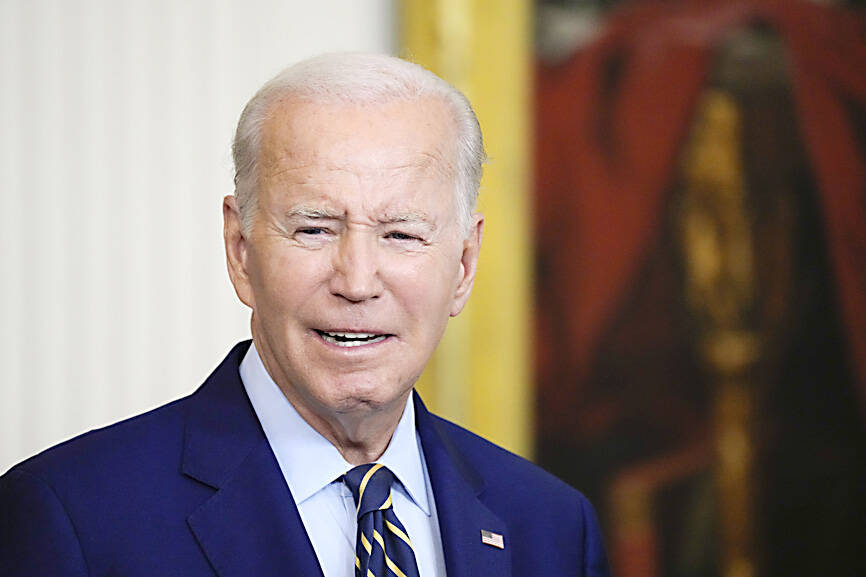US President Joe Biden on Monday signed into law a bill that approves the first agreement negotiated under a bilateral trade initiative between Taiwan and the US, the White House said in a statement.
The United States-Taiwan Initiative on 21st-Century Trade First Agreement Implementation Act took effect immediately after Biden signed it, the statement said.
After a year of negotiations, Representative to the US Hsiao Bi-khim (蕭美琴) and American Institute in Taiwan Managing Director Ingrid Larson on June 1 signed an initial agreement under the US-Taiwan Initiative on 21st-Century Trade in Washington.

Photo: AP
The first agreement, which does not cover tariff reductions or exemptions, covers general principles related to customs and border procedures, regulatory practices and anti-corruption practices.
It is hoped that the principles will facilitate bilateral trade and investment flows in part by minimizing border formalities, setting standards for the regulation of domestic services, and supporting small and medium-sized enterprises.
On June 9, US Senate Senate Committee on Finance Chairman Ron Wyden and US House of Representatives Committee on Ways and Means Chairman Jason Smith proposed the bill backing the first agreement under the trade initiative.
The legislation requires the US president to report to the US Congress on how the first agreement with Taiwan would enhance Taiwan-US trade relations and advance the interests of US workers, consumers, enterprises and farmers.
The president must also certify in writing to Congress within 30 days of the agreement entering into force that Taiwan has taken the necessary measures to comply with the terms of the agreement.
The bill requires US officials to ensure that any additional agreements with Taiwan be made transparently and in full consultation with Congress.
In the White House statement, Biden voiced concern over a portion of the law.
In cases where the requirements of Section 7 of the act, which require the transmission of trade deal drafts to Congress, would “impermissibly infringe upon my constitutional authority to negotiate with a foreign partner, my administration will treat them as nonbinding,” he said.
The bill, which the Senate passed on July 18, cleared the House on June 21 and was then sent to the president on July 27 to be signed into law within 10 days after being signed by House Speaker Kevin McCarthy.

Taiwan has received more than US$70 million in royalties as of the end of last year from developing the F-16V jet as countries worldwide purchase or upgrade to this popular model, government and military officials said on Saturday. Taiwan funded the development of the F-16V jet and ended up the sole investor as other countries withdrew from the program. Now the F-16V is increasingly popular and countries must pay Taiwan a percentage in royalties when they purchase new F-16V aircraft or upgrade older F-16 models. The next five years are expected to be the peak for these royalties, with Taiwan potentially earning

STAY IN YOUR LANE: As the US and Israel attack Iran, the ministry has warned China not to overstep by including Taiwanese citizens in its evacuation orders The Ministry of Foreign Affairs (MOFA) yesterday rebuked a statement by China’s embassy in Israel that it would evacuate Taiwanese holders of Chinese travel documents from Israel amid the latter’s escalating conflict with Iran. Tensions have risen across the Middle East in the wake of US and Israeli airstrikes on Iran beginning Saturday. China subsequently issued an evacuation notice for its citizens. In a news release, the Chinese embassy in Israel said holders of “Taiwan compatriot permits (台胞證)” issued to Taiwanese nationals by Chinese authorities for travel to China — could register for evacuation to Egypt. In Taipei, the ministry yesterday said Taiwan

‘LIKE-MINDED PARTNER’: Tako van Popta said it would be inappropriate to delay signing the deal with Taiwan because of China, adding he would promote the issue Canadian senators have stressed Taiwan’s importance for international trade and expressed enthusiasm for ensuring the Taiwan-Canada trade cooperation framework agreement is implemented this year. Representative to Canada Harry Tseng (曾厚仁) in an interview with the Central News Agency (CNA) said he was increasingly uneasy about Ottawa’s delays in signing the agreement, especially as Ottawa has warmed toward Beijing. There are “no negotiations left. Not only [is it] initialed, we have three versions of the text ready: English, French and Mandarin,” Tseng said. “That tells you how close we are to the final signature.” Tseng said that he hoped Canadian Prime Minister Mark Carney

POSITIVE DEVELOPMENT: Japan and the US are expected to hold in-depth discussions on Taiwan-related issues during the meeting next month, Japanese sources said The holding of a Japan-US leaders’ meeting ahead of US President Donald Trump’s visit to China is positive news for Taiwan, former Japan-Taiwan Exchange Association representative Hiroyasu Izumi said yesterday. After the Liberal Democratic Party’s landslide victory in Japan’s House of Representatives election, Japanese Prime Minister Sanae Takaichi is scheduled to visit the US next month, where she is to meet with Trump ahead of the US president’s planned visit to China from March 31 to April 2 for a meeting with Chinese President Xi Jinping (習近平). Japan and the US are expected to hold in-depth discussions on Taiwan-related issues during the